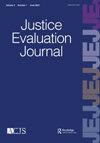Choosing Representatives to Deliver the Message in a Group Violence Intervention
IF 0.7
Q3 CRIMINOLOGY & PENOLOGY
引用次数: 2
Abstract
Abstract The group-based violence intervention model is predicated on the assumption that individuals who hear credible messages of consequences for further violence will deliver the message to other group members. Using social network analysis, we develop an algorithm of who should receive the message to maximize the spread of the message among the remaining group members. Using a sample of gangs in four different cities we show how the reach of actual call-ins were suboptimal compared to our suggested algorithm. Using simulations, we further show that typically only around a third of the group needs to be delivered the message to achieve complete coverage of the network. We find that even when limiting possible invitees to those under supervision large proportions of groups can be reached if the invitee list is data driven.在团体暴力干预中选择代表传递讯息
基于群体的暴力干预模型是基于这样一种假设:当个体听到了关于进一步暴力后果的可信信息后,会将该信息传递给其他群体成员。利用社会网络分析,我们开发了一种算法,谁应该接收信息,以最大限度地在剩余的小组成员中传播信息。使用四个不同城市的帮派样本,我们展示了与我们建议的算法相比,实际呼叫的覆盖范围是如何不理想的。通过模拟,我们进一步表明,通常只有大约三分之一的组需要传递消息来实现网络的完全覆盖。我们发现,如果受邀者名单是数据驱动的,即使将可能的受邀者限制在监督之下,也可以达到很大比例的群体。
本文章由计算机程序翻译,如有差异,请以英文原文为准。
求助全文
约1分钟内获得全文
求助全文

 求助内容:
求助内容: 应助结果提醒方式:
应助结果提醒方式:


